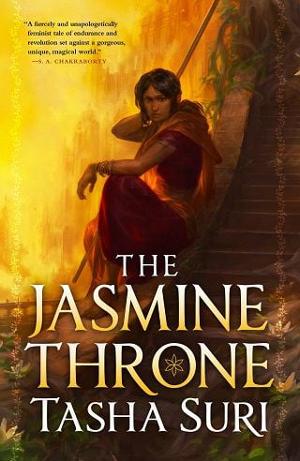Chapter 8: Ashok
ASHOK
The sound of the rain drew Ashok back into his skin. He heard it drum with a hundred thousand fingertips against the soil. He heard it beat a low, hollow song against the wood that surrounded him. He breathed deep and slow, a breath that was like the winding and unwinding of a coil of rope, and knew that it had been raining for some time, and that it was not the sound of the rain alone that had brought him back. He could feel a strange pain along the vertebrae of his spine; there was a heaviness in his throat and his eyes, a threat of grief he wouldn’t allow himself to fulfill. No tears. A man did not weep.
But Meena was dead.
He had felt her go, in the sangam, the space that lay beyond flesh. He had felt the painful blood-heat of the mask upon her face, melting her skin to sap, and the slide of her body to death. The loss of her lay upon his shoulders.
He had trained her: taught her how to scrap with other children with her nails and her teeth, how to handle a blade and throw a punch and sever a man’s artery just so. He’d taught her what the Parijati had leached from Ahiranya’s bones. He’d instilled in her the knowledge that freedom for Ahiranya was worth any price.
Then he had given her a vial of water and let her choose. As if a choice, carefully bred into your nature by grief and training and hardship, was any choice at all.
What a waste of a good weapon.
He exhaled and leaned forward, pressing his chin to his neck to ease the vise of tension still clamped upon his spine.
Although the rain was still fierce, Ashok was dry. He had chosen his spot well. He sat, cross-legged, in the hollowed heart of a dead tree, a great husk of a thing with its innards scraped clean. Around him, in a clearing still black and ash marked from the burning of rot-riven trees, there was no similar cover. His brothers and sisters were camped in a nearby copse gently shaded by great leaves large enough to blot out the worst of the rain. They were invisible to him, from here, and he to them.
He was glad of the privacy. He pressed his knuckles to his eyes, left then right, and rose to his feet. He stooped to leave the shelter of the tree, then stepped out into the falling rain, which was clear and sweet and shockingly cold.
For all Meena’s failures, there was a poetry in her death that moved him. He was best at war—the kiss of a blade against a throat held more eloquence to him than a verse—but he had sat in pleasure houses, listening to the poets spin tales about the brave rebels, weaving them into the rich epics of the Age of Flowers. Interspersed between forbidden recitations of the Birch Bark Mantras, they twined together the actions of Ashok’s masked band with the legendary strength of the ancient temple elders. They spoke passionately of how the mothers of flame had cruelly erased Ahiranya’s bright future. The most skilled poets set grown men weeping with rage and passion.
He wondered what they would make of Meena’s death—a rebellion upon the Hirana, a failed fight against a cruel regent.
He would have to let the story slip.
If his grief had undone him after all, at the thought of the tale of her, the tragedy of it—if his eyes stung with tears for an impetuous soldier who had chosen her death unflinching—then he refused to acknowledge it. Let the rain take what he did not want. Let it hollow him. He was a leader of men and women, a temple son tested and twice-lived. And he had felt someone else in the sangam: a presence like a blade, focused and clean and pure, that had turned its cold hands on him, and seen him, through the river of heart and flesh.
Plans. There were always plans to be made or undone, and no time to mourn.
Kritika waited under the cover of the vast leaves, the long end of her sari draped over her hair. Ashok did not know how long she had been watching for him.
“What passes?” she asked.
“Meena won’t be returning to us,” Ashok replied. “She’s dead.”
Kritika sucked in a sharp breath. Her mouth, her eyes, her very bones seemed to pull tighter.
“She acted rashly,” said Ashok.
“How?” Kritika dabbed her tear-wet cheeks ineffectually with her fingertips. “What did she do?”
Ashok shook his head. The sangam did not show him everything. It could not. Within its liminal space, he had the capacity to feel a great deal: memory, emotion, fragments of thought. But Meena had not been twice-born—had barely been once-born, thanks to the deathless waters she’d consumed from the vial. And she had reached for him only in the moment when she had begun to fall from the Hirana, when death had been an inevitability. All he had felt from her had been impressions, as muddied as light through monsoon rain. Pain, molten flesh. The flash of piercing eyes. The claws of gravity at her back. The bitter thread of words unspoken upon her tongue.
Ashok. Please—
forgive me.
He told Kritika none of it. Instead he rolled his shoulders, his spine all grief knots, and said, “She wore the mask.”
“I thought that was only for emergencies. Do you think she was discovered? Attacked?”
“We’ll know soon enough. Tell Ganam to pack up and move the main camp.” The rebel movement against Parijatdvipan rule was disparate, made up of multiple limbs that did not all obey the same master. But if the rebellion had a heart, then Ashok considered it to be his people. They were the ones willing to commit violence, and they were good enough at it to move swiftly, masked and lethal, murdering advisors and merchants and imperial loyalists, slowly eroding the struts holding up the empire’s bones. Sometimes he called the main camp his own temple council, half joking. But he had seen the way it made their eyes light up. He thought often now of what a useful yoke a tale could be.
And his people were a council of a kind, canny enough to help him maintain his own network of spies and allies, across the highborn households of Parijatdvipa. Even the regent’s household, which was irritatingly difficult to infiltrate.
Speaking of. He did not think Meena had been interrogated. But he could not be sure. Better to be cautious than see more of their number dead. “You should go to the mahal. See if there’s anything more to be learned about her death.”
Kritika swallowed. Inclined her head. She turned to walk away, and Ashok halted her, placing a hand upon her shoulder. “I grieve her too,” he said.
“I know.” Kritika lowered her eyes. “I don’t doubt you,” she added, in a rising tone that denoted respect. “But…”
She trailed off. Ashok looked at her face—how drawn it was, the way even the wrinkles upon it seemed like bands of pain—and said, “Tell me.”
“Sarita is ailing,” Kritika said reluctantly. “And Bhavan is—not long for this world.”
Two more. Two more weapons, trained and lost.
“Then we need to find the deathless waters all the more urgently, for all our sakes.” He pressed his knuckles to his forehead. “Wait a moment, Kritika,” he said. “Let me think for a time.”
Cost and gain. Sacrifice and success. He had lost Meena, lost a mask made of sacred wood, lost a pair of eyes in the general’s mahal and feet upon the Hirana for approximately nothing. This mission had all been sacrifice and cost, with no success or gain to balance its disasters. He had failed.
But as a boy, he’d had truths bred into his bones by loyalty to a higher vision, a vision that was pitiless in its demands. He turned to those truths now. They stared back at him in return, unblinking, all-knowing.
All failure was born from weakness. This was truth. He had known better than to send Meena on a task that required both patience and cunning. She was—she had been—too rash and too fierce, too openhearted. And she had known she was dying. She had known they were all dying. Desperation had undone her. And as her leader, he should have known it would.
But Ashok had wanted her to succeed. He had wanted it because she had reminded him of another girl and another time, of hopes sacrificed, and he had thought, If Meena is even a shadow of her…
He lowered his hand. Kritika waited, quiet and watchful. “I have been a fool,” he said finally.
Sentimentality had its place when it served a function; when it helped achieve the greater ideal of an Ahiranya free and powerful, as it had once been. But his love—no. The blood tenderness of it was nothing but weakness.
Love had led him astray and wasted Meena’s life. Even now, his weak nature quailed at the thought of doing what was necessary. Even now, he thought of a night long ago, when he had kneeled under the wavering light of lanterns, his hands upon bird-bone-thin shoulders. His sister’s shoulders.
He remembered telling her a lie. Wait here, he’d said. And I’ll come back for you. I promise.
She’d looked at him with such trust. He’d never forgotten that look.
“There is a maidservant in the regent’s household. A woman named Priya. Tell our newest addition to bring her to me. The resistance has need of her.”
He had tried to save her once. He had let her go. He had set loyal eyes on her now and again, and through them, he had watched as she had grown up without him. He’d believed he could let her live free of the purpose that held him constantly by the throat. But he could not be weak any longer. He had felt her in the sangam. She had been there when Meena had died. There was strength in her now—so much power, more than she had possessed in all the years he’d kept watch on her—and he could use her.
If only he had made this decision sooner. If only he had told Meena to reach out to her, to ally with her. But no matter. There was still a way forward. He could still turn his sister’s gifts to his own ends.
Ahiranya was worth any price. Even her.
 Fullepub
Fullepub 



